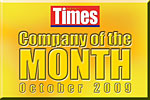 |
 KIRAN PANDAY |
His own contribution in that direction has come largely in the IT sector, and follows a long fascination with gadgetry and computers. He learned the programming language BASIC in high school and studied IT business applications in the United Kingdom. Soon after he returned to Nepal in 1989, he set up software company IT Nepal and went on to develop the first Nepali Enterprise Resource Management tool.
Following these successes, Golchha founded Neoteric to locally distribute internationally branded hardware, like Samsung LCD screens. He also catered to a large market for assembled computers, which were not only customisable but also significantly cheaper. More recently, Neoteric has also become a leading distributor of Nokia phones and appliances in Nepal.
Neoteric is at war with a 'grey market' - the nebulous and legally dubious traffic of refurbished Indian and Chinese goods, many of which boast recognised brand names with a stray letter or two inserted, a 'Nokla' instead of 'Nokia', for instance. Golchha claims that while Neoteric's products are pricier, they are better quality and come with international standard service and warranties. "Before we entered the market, as much as 40% of the IT goods circulating here were either fake or were smuggled into the country," he says.
Underpinning these business ventures is a commitment to help the common man and empower the individual. Before Neoteric came along, only large corporations, and very few households or small businesses, had the high-grade HP and Samsung gear that Golchha markets. And that state of affairs was disastrous, he says, because in the Internet age, connectivity is as elementary as water or food. Golchha reveals an almost missionary zeal for Nepal and the Internet: "Imagine what Nepal would be like if everyone had a laptop with an Internet connection."
Indeed, that vision of a Nepal of laptop-toting villagers and grandpas is why Neoteric is, as Golchha calls it, 'leapfrogging' conventional desktops into the laptop business. He points out that laptops are sturdy and high quality, and almost as cheap as desktops, which means they have enormous social and commercial potential. They promise to correct what Golchha calls Nepal's 'chicken-and-egg' problem: not many are bothered to buy Internet connections in part because the content isn't great, or doesn't suit specific Nepali needs, and there's poor content because few Nepalis are connected. Golchha thinks by making laptops easily available, he can short the loop and encourage more people to buy into the Internet age.
The Golchha Organisation, a fraternity of firms including Neoteric that is held by the Golchha family, sponsors a number of social service activities. They run an eye hospital in Biratnagar that offers treatment for free or at negligible prices and serves about 80,000 people annually. They also sponsor academic scholarships, and have made headway on a slew of environmental initiatives. Golchha says they're dabbling in non-conventional energy sources like husk and in characteristically far-sighted manner, have begun recycling electronics to prevent hazardous build-ups of electronic waste.
"It's a big problem in rich countries," he warns. "And if we're not careful, it could be a big problem here too."
Taking on software, hardware and social service is no mean feat, and involves a degree of risk in the volatile business and political environment of Nepal. Golchha admits he's made business mistakes in the past, but accepts that risks are part and parcel of entrepreneurship. "What Nepal needs more than ever is a risk-friendly investment climate that ensures businesses ownership of the rewards," he says.
"If we do these things, nothing can stop us."
Bold is the word.
Previous Company of the month:
November 2007
December 2007
January 2008
February 2008
March 2008
April 2008
May 2008
July 2008
April 2009
May 2009
June 2009
July 2009
August 2009
September 2009


